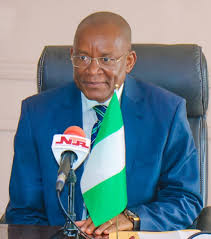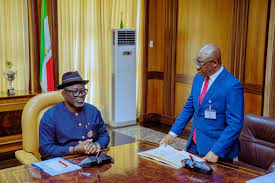News
Probe NDDC Operations, Spending, CSOs Tell Oil Producing Communities
Some Civil Society Organizations (CSOs) have charged residents of oil producing states to exercise their rights by challenging the activities of the Niger Delta Development Commission (NDDC) for it to deliver on its mandate in the affected communities.
The CSOs also resolved at a workshop in Akure, the Ondo State capital to form a movement that would henceforth work with the people in the mandate areas to ensure that projects executed by NDDC were monitored and evaluated.
These were part of the submissions of stakeholders at an Agenda Capacity Development Workshop held in Akure, at the weekend.
The theme of the workshop was, “Straightening CSOs and community agency capacity to engage NDDC”, and organised by the Social Development Integrated Centre, also known as Social Action, and MacArthur Foundation.
In his presentation, the Chairman, Civil Society Coalition in Ondo State, Mr Franklin Oloniju, said the level of corruption in the NDDC over the years had negatively affected it from alleviating the sufferings of the people of the oil producing states, hence the need for those affected to start asking questions.
Oloniju pointed out that people should ask questions about the activities of NDDC to ensure accountability and transparency, adding that checks and balances must be activated to demand for the needful from NDDC.
He said, “Over the years, we have found that the mandates of NDDC have not benefited the people and the commission itself has been plagued with a lot of issues around corruption, inefficiency, ineptitude activities, not being transparent and accountable. So, these are some of the problems that plagued the commission for a long time.
“Based on emerging trend and for the fact that they still continue to hold the destiny of millions of people in their hands in term of being unable to deliver on their mandates, it is important that people must start to hold the commission accountable for them to be able to deliver on their services.”
“That is why we are bringing stakeholders across the region to see we can form a movement that will put NDDC on its toes and ensure that it does what it is supposed to do appropriately and efficiently.
“A lot of money budgeted for intervention and construction are not mostly executed and if they are done,they are executed in as substandard. So how can we continue in that manner? There is a need for us to rejig the processes that go on within the NDDC for it to deliver on the services.
“One of the things we noticed as stakeholders is that a lot of people still don’t understand the mandate of NDDC and they don’t understand the fact that NDDC should be accountable to them, especially those at the mandate areas. They also do not have the understanding of how to engage NDDC for them to be accountable.
“We also found that people at mandate areas don’t show much interest because there is a lot of shielding in secrecy of NDDC activities and its budget.
“Our presentation is to open up their eyes that they have a role to play in ensuring that this commission delivers on its mandate.
“For them to also understand the importance of people with disabilities, women in the running of the NDDC, looking at gender as a component that has been neglected when allocations of posts, resources are carried out and programmes are planned.
“There is a lot of exclusion and marginalisation within the NDDC and people of the community must be ready to address such marginalisation.
“Until the people are conscientised to take up their responsibility and challenge those in charge, there won’t be any change in the way NDDC is being run. So people need to put more searchlights on the activities of NDDC because NDDC has become a milking cow for a lot of people. And those legislators, doing oversight are not really doing their jobs appropriately,” Oloniju submitted.
In his presentation, Senior Programme Officer, Social Action, Prince Edebo, said, “The essence of this workshop is to build the capacity of the community groups and leaders to engage the Niger Delta development commission which was set up for the development of communities for the extraction of oil produced from their region”.
Edebo opined, “So, there is a need to get back to the communities. However and unfortunately, this has not been the case as it is currently. So, this workshop is geared towards ensuring that communities are empowered to engage the commission for community development.
“Part of our plans is that communities, will after now, begin to engage NDDC because they would have been thought advocacy skills, communication skills and engagement skills.
“They would have been thought to carry out community needs assessment, how to look at small at small fiscal financial skills around needs assessment.
“They will also understand that it is not everything they need will be provided. They should also play their part by ensuring that it is what is needed that should be requested for,” Edebo said.
Participants were drawn from all the oil producing states in the country, where some of them described the workshop as an eye-opener.
News
NASS commends FIRS for surpassing 2024 target, sets 2025 goal

The National Assembly has lauded the Executive Chairman of the Federal Inland Revenue Service (FIRS), Mr Zacch Adedeji, for exceeding the 2024 revenue collection target of N19.4 trillion.
FIRS generated N21.6 trillion, surpassing the target by N2.2 trillion.
The commendation came during a meeting on Wednesday in Abuja, where the FIRS chairman appeared before the joint committee on Finance to defend the service’s revenue projections for 2025.
The committee proposed a N25 trillion revenue generation target for FIRS in the coming fiscal year.
Deputy Chairman of the House of Representatives Committee on Finance, Saidu Abdullahi, was the first to commend Adedeji’s performance, calling it “unprecedented” and “worthy of commendation.”
“The feat achieved by FIRS in revenue collection for 2024 was unprecedented and truly commendable.
“Surpassing the target set for the agency in the 2024 Appropriation Act, from N19.4 trillion to N21.6 trillion, is both encouraging and impressive,” he said.
He encouraged the FIRS to study the tax collection methods of South Africa, which generated higher tax revenue, and to focus on expanding the taxable base to include more informal sector workers.
Sen. Joel Onowakpo emphasised that tax collection was a global norm, and advised the committee to raise FIRS’s projected 2025 revenue target to N30 trillion.
Similarly, Sen. Binos Yeroe lauded Adedeji’s innovative approach in surpassing the 2024 target.
“Your performance in 2024 was highly commendable, and I hope you continue to maintain this level of success,” he said.
Rep. Etanabene Benedict suggested aiming for N60 trillion in 2025 to avoid borrowing.
Committee chairmen also supported the proposed N25 trillion revenue goal for 2025; with Sen. Sani Musa stating that it was both “achievable and surpassable.”
News
Abbas, Kalu express grief over Deputy Chief Whip, Onanuga’s death

Speaker of House of Representatives, Tajudeen Abbas, has expressed deep grief over the demise of the Deputy Chief Whip of the house, Rep. Adewunmi Onanuga.
In a statement on yesterday, Abbas described the late lawmaker as a strong pillar who would be sorely missed in the house.
The Tide source reports that Onanuga, who died on Wednesday, represented Ikenne/Sagamu/Remo North Federal Constituency and was serving her second term in the house.
Abbas said that he had led members of the house in support and prayers for Onanuga during her health challenge and was hopeful of her recovery, saying that her eventual death was painful.
He recalled Onanuga’s campaigns for gender equality, women empowerment and inclusion in politics and governance, as Chairman, House Committee on Women Affairs and Social Welfare in the Ninth House and as a principal officer in the 10th House.
Abbas also recalled how the late lawmaker, as the only female member in the leadership of the house, inspired and rallied female legislators for the greater good of the chamber and the country in general.
“Onanuga was a brilliant woman, experienced politician, resourceful lawmaker and a dependable ally in the legislative business,” he said.
Abbas commiserated with the Onanuga family and her constituents, the people and the government of Ogun as well as the All Progressives Congress (APC) on the demise of the legislator.
Also, the Deputy Speaker, House of Representatives, Rep. Benjamin Kalu, expressed sadness over Onanuga’s death.
Kalu described the deceased as a shining example of dedication, compassion and selfless lawmaker whose service to her constituents and the nation was outstanding.
He acknowledged her support for the Peace In South East Project (PISE-P), which demonstrated her passion for defeating insecurity in Nigeria.
“Onanuga was a dedicated and committed lawmaker, renowned for her unwavering commitment to peace.
“Her passion for promoting harmony and understanding was truly commendable. Beyond her legislative accomplishments, Onanuga’s compassion, humility and simplicity inspired countless individuals.
“Her warm and infectious smile, coupled with her empathetic nature, endeared her to everyone she met, making her a beloved figure in the lives of many,” he said.
Kalu said that Onanuga would be remembered for her commitment to the cause of women’s empowerment and political inclusion as well as her relentless efforts toward ensuring that the gender bills were passed.
The deputy speaker extended his heartfelt condolences to the Onanuga family, her colleagues and constituents, saying that she would be greatly missed.
He prayed for the peaceful repose of the soul of the late lawmaker and the fortitude to bear the loss.
News
Rotary Foundation commits $300m to polio eradication in Nigeria

The Rotary International Foundation says it has committed over 300 million dollars to polio eradication in Nigeria.
Its Chairman, Board of Trustees, Mark Maloney, disclosed this on Thursday while conducting polio immunisation at a Primary Healthcare Centre in Jahi, Abuja.
According to him, polio eradication is Rotary’s number one priority worldwide and it is focused on eradicating the variant type two poliovirus cases discovered in 2024.
Maloney said efforts towards eradicating the polio variant should be intensified, adding that recording success in that area would be beneficial to the Nigerian government.
He also commended the Federal Government’s polio accountability programme as well as all Rotarians for their efforts in putting an end to the disease.
“The Nigerian government is facing a significant challenge with the continuation of variant polio type two, and so far, we have seen about 92 cases through the cases that have been evaluated in 2024.
“We encourage the government to redouble their efforts to put the focus on this polio eradication as they did with the Wild Polio Virus (WPV), and they were successful.”
On new donations to Nigeria, Maloney said that Rotary would allocate some funds in 2025, but the amount was yet to be determined.
“There are 50 million dollars that I expect will be allocated, but a lot of it has to go to Pakistan and Afghanistan, where WPV is still endemic.
“Though, I think there will be a significant tranche of funds, maybe not tens of millions, but a significant amount of money will be allocated to Nigeria,” he added.
The chairman noted that the organisation has allocated two million dollars to its Programme of Scale project aimed at reducing the rate of birth-related mortality in Nigeria.
“What we are looking to do is to decrease the rate of mortality in births in this country, and it is operating now in several districts.
“One way that the mortality rate can be decreased is for more births to happen in a healthcare facility rather than at home.
“We have seen in the first year of the programme a significant increase in the percentages of births happening in medical facilities.
“One district had gone from 11 per cent happening in medical facilities to 33 per cent, which is a significant increase,” he added.
The Chairman of the organisation’s Nigeria National Polio Plus Committee, Mr Joshua Hassan, said outbreak immunisation efforts are conducted locally in response to the vaccine-derived variant of polio.
Hassan said national immunisation days are planned twice a year for the entire country.
According to him, the organisation is focusing more of its efforts on Kano, Zamfara, Katsina, Kebbi, and Sokoto states.
Prof. Emmanuel Lufadeju, the National Coordinator of Together for Healthy Families in Nigeria, said that the Programme of Scale project was designed to reduce maternal mortality among women by 25 per cent.
Lufadeju said that this is done through community dialogue, home outreaches, medical outreaches, and capacity building.
“We are going to train a lot of people, including doctors and nurses.
“Then we are going to do something that is called a social, behavioural change, to change the attitude of people and make them deliver in the facility instead of delivering at home.”
He added that the two million dollar project, which began in 2024, is expected to end in 2025.
The Tide source reports that Maloney is in Nigeria for an official visit to embark on advocacy, carry out symbolic immunisation, visit the Programme of Scale project areas, and also visit President Bola Tinubu.
-
Rivers4 days ago
Kelga Boss Tasks Residents On Peace … As Elele Community Holds Thanksgiving
-

 Business4 days ago
Business4 days agoMinister Inspects Nigeria/Benin Republic-owned Sugar Firm … Decries Decrepit Condition
-

 Featured4 days ago
Featured4 days agoUAE president to visit Nigeria in 2025
-

 Featured3 days ago
Featured3 days agoWe’re Vigilant, Steadfast In Preserving Peace, Stability Of Rivers – Fubara …Lays Wreath To Mark 2025 Armed Forces Remembrance Day
-
Rivers4 days ago
Fubara Approves N50m For Widows Of Fallen Service Personnel
-
Nation4 days ago
BPP Saves Nigeria N1.9trillion from Contracts Fraud – DG
-
Niger Delta4 days ago
Customer Petitions Banks Over Fraudulent Withdrawals
-

 Niger Delta3 days ago
Niger Delta3 days agoDelta To Blacklist ‘Bad’ Contractors

